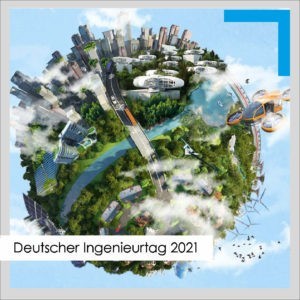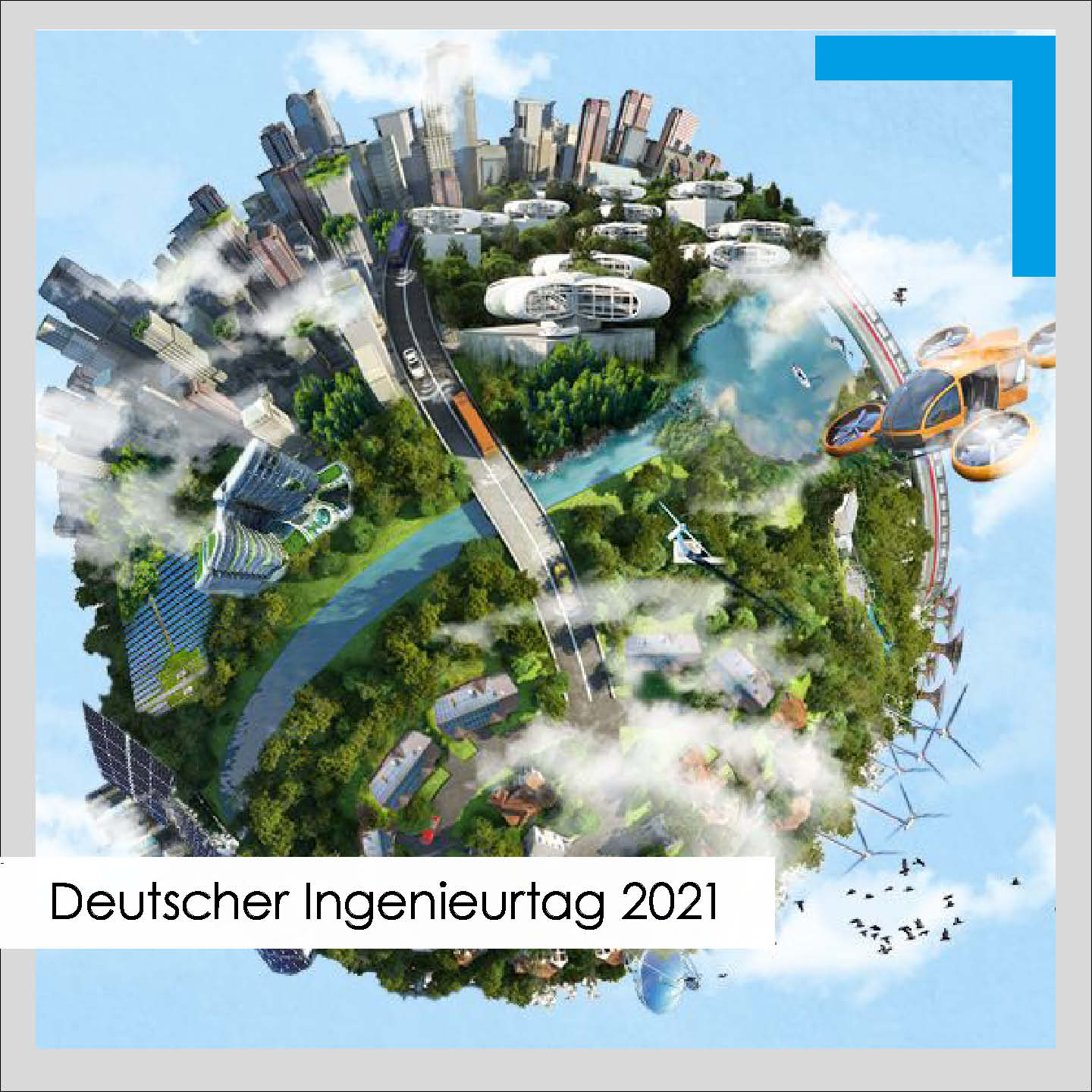

DEUTSCHER INGENIEURTAG 2021 on 20 May 2021 Together for the 1.5-degree climate target
Due to the Corona pandemic, this year's 30th German Engineers' Day took place online. Around 6,000 active participants helped to enrich the content of the German Engineers' Day with its total of 24 breakout sessions and the Experience Cafés and generated a positive response from participants.
The opening took place by Dipl. Wirtsch.-Ing. Ralph Appel, Director of the VDI e.V. He once again emphasised the relevance of the topic of the German Engineers' Day: "This topic decides whether the next generations will still be able to find a planet worth living on. This topic concerns us all.
This was followed by the welcoming address by the Federal Environment Minister Svenja Schulze via video. In her welcome address, she picked up on the role of the VDI in the introduction of CO2 prices and pointed out the opportunity and importance of change.
Robert Habeck followed, Party Chairman of BÜNDNIS 90/DIE GRÜNEN and VDI President Dr.-Ing. Volker Kefer, the Agreed in dialogue on the interplay of their roles in achieving the 1.5 degree climate target. "We as politicians set the goals, the engineers propose the best options and then implement them," said Habeck. Kefer made it clear in the exchange that the VDI is very happy to make its expertise available to politicians: "We are there for the development of technical solutions.
In a panel discussion, science and industry discussed achieving the 1.5 degree target. Prof. Dr Mark Lawrence, Executive Scientific Director at the IASS emphasised: "The probability of reaching the 1.5 degree target is very low; and Germany alone cannot achieve this, but it can play a pioneering role! Through Dr Frank Mastiaux, CEO of EnBW, it was stated: "If we continue like this, it won't work." Donya Amer, transformer at Bosch, explained: "Climate protection costs, but doing nothing is more expensive." Prof. Dr.-Ing. Harald Bradke, Chairman of the Interdisciplinary Panel on Climate Protection and Energy Transition at the VDI, has as his wish for the future that all energies come from renewables and that all cycles are closed. That is the future. Also Dr Markus Steilemann, CEO at Covestro, wants his company to be fully committed to the Circular Economy by 2045.
A very different perspective on climate change was brought to us by the astronaut and climate researcher Dr Insa Thiele-Eich via video link: "The atmosphere is a very fragile construct. Industrialisation brought a lot of positive things, but has also contributed to the fact that we need more and more climate protection or human protection". The effects of climate change vary across the globe and Germany bears a great responsibility in this regard "The more privileged, the more responsibility."
Various breakout sessions were offered, in which more than 4,000 engineers participated, discussed and got new impulses. Active participation contributed to enriching the content of the German Engineers' Day and generated a positive echo among all participants.
Many exciting and interesting impulses and topics were dealt with, which also attract a lot of attention within the Mull Group: Engineering for a better tomorrow!
The following are the breakout sessions held with the main contents / key messages
Climate protection in the heating market - building blocks for a climate-neutral heat supply
Without the energy transition in the heating sector, the 1.5° target is not achievable, existing buildings dominate heat demand, increase renovation rate to 4 %!
Industry4Climate
VCI Roadmap 2050: Complete decarbonisation of the chemical industry through 7 million tonnes of green hydrogen and 600 TWh of green electricity at 4ct/KWh; the steel industry needs a further 2.5 million tonnes of green hydrogen and 250 TWh of green electricity.
Technologies of Life Sciences
A holistic/ecological interpretation of bionics/biological transformation together with comprehensive sustainability strategies is more than desirable. Nature as a role model - Let it grow!
Buildings of the future: circular and digital
Large share of the building sector in global resource consumption and greenhouse gas emissions.
Circular Economy in technical building equipment can contribute to solving problems through recyclability, flexibility and freedom from pollutants. CO2-Optimised designs lead to the reduction of CO2-emissions.
Electricity & Grids
The share of renewable energies (RE) in primary energy consumption must be massively increased. Efficient use of RE e.g. heat pump & electric vehicles (BEV and FCEV). Grids must be digitalised
Sector coupling and power-to-X
Power to Heat necessary for efficient climate contribution in the heating sector. Global hydrogen logistics a question of cost. Ammonia as hydrogen carrier for transport over long distances.
Meeting the 1.5 degree climate target - utopia or opportunity?
From 2019, Germany has a residual budget of 7.3 GT CO2 available. In order to achieve the climate protection goals, a transformation is necessary in all areas (energy transition, mobility transition and food transition). Everyone can do something!
Innovative lignite phase-out - Supraregional support for change (Part 1 and 2)
VDI dialogue Innovative lignite phase-out: Effective support and promotion of the future-oriented phase-out of lignite and the progressive transformation of all regions
Future Mobility - sustainable and digital
Drive technologies of the future - What will drive our mobility of the future?
Drive concepts for mobility are currently being discussed in politics, society, science and industry, including in this session.
Automated and connected transport
Challenges of our mobility today have to be solved for individual transport, local public transport as well as the distribution of deliveries in cities up to long-distance freight transport.
Green hydrogen, the gold of the North?
Hydrogen strategies Germany / EU foresee exponential growth of electrolysis capacities. A large share of the required hydrogen volume will be covered by imports. However, major challenges for the production of green hydrogen can be solved.
VDI Young Engineers >> Meet the future
Production of over 95 % fossil-based plastics generates approx. 4% of global climate gas emissions. No 1.5 degrees without functioning circular economy systems / circular value creation. Use of sustainable raw material sources such as biomass
Circular Economy
25 % of global greenhouse gas emissions result from material supply, material demand for technology-critical metals continues to rise. Circular economy, innovation and more intensive use make material stocks 1.5°C compatible. Rethinking towards value-added products, product-as-a-service and "sharing instead of owning". Recycling rates for plastics and many metals must be massively increased.
At the end of the German Engineering Day, participants were able to log on to Experience Cafés for face-to-face discussions on the topics from the breakouts and for relaxed, virtual networking with peers and professionals.
Links to sources:
https://www.vdi.de/deutscher-ingenieurtag/rueckblick
Learn more about our work and projects and follow us: ![]()
![]()
![]()
![]()
#mullandpartner #engineeringforabettertomorrow #GermanEngineersDay2020 1TP5Engineer 1TP5ClimateProtection


